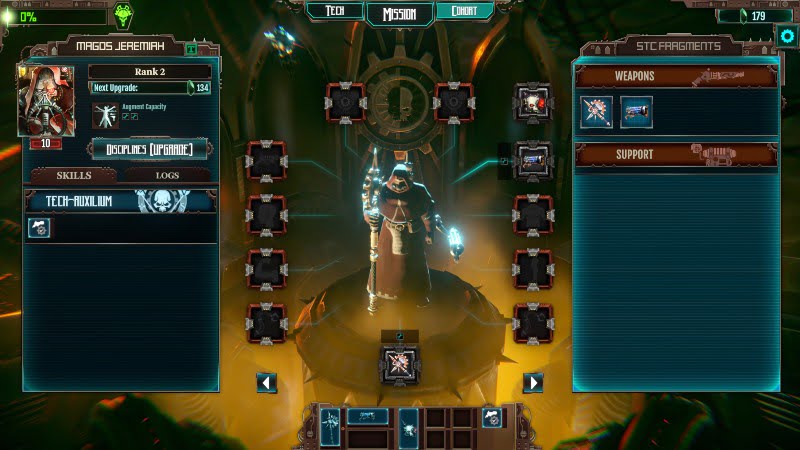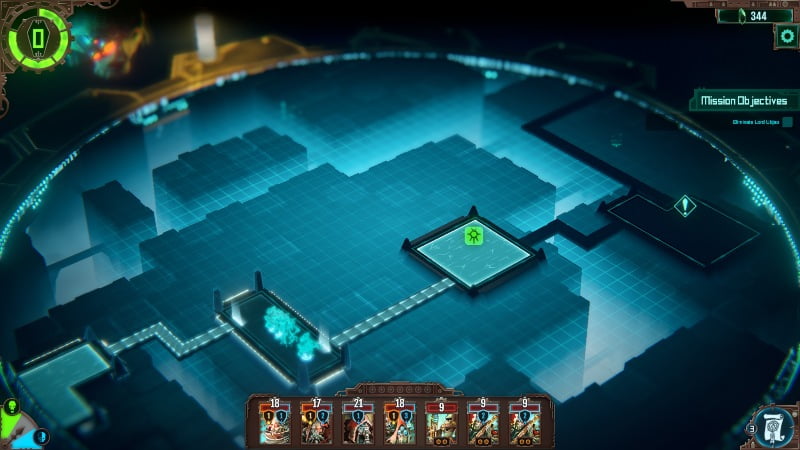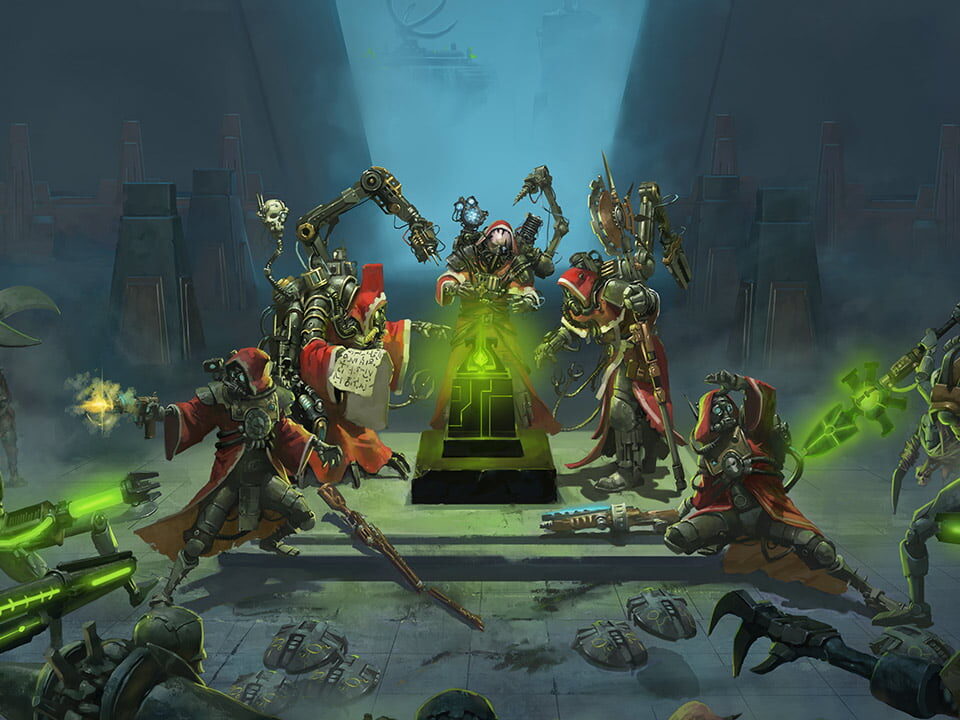If there’s any property that hasn’t shied away from the realm of video games, it’s Warhammer.
From the top down strategy of Total War to the third person action of Space Marine, there’s been a wealth of adaptations in a variety of genres stretching back as far as the original PlayStation. The catch, however, is that very few have turned out to be good.
Entering the words ‘Warhammer’ into Metacritic search nets a river of murky yellow and blaring red squares. This leaves the iconic tabletop strategy franchise with something of a tainted reputation when it comes to the realm of video games. So, with the recent release of Bulwark Studio’s new RTS, Warhammer 40,000 Mechanicus, has the small development team managed to evade the IP’s infamous notoriety? For the most part, the answer’s yes.
Cashing in on the upwards trajectory of XCOM-inspired real-time strategy games, Mechanicus is an atmospheric and addicting adventure in the Warhammer universe that feels incredibly faithful to the fans, while subsequently offering tactical action to newcomers. It’s not as technically proficient as the games it takes influence from – and is at its worst when it tries to divert too heavily from their formula – but when Mechanicus is forcing you to think deeply into its nuanced mechanics, it stands as one of the most entertaining Warhammer games in recent memory.

What you’ll first notice when booting up the game is just how atmospheric its world looks and feels to inhabit. The game is visually sensational. Certain touche,s such as the murky depth of field and vibrant gothic colour palette, make what could’ve been a bland world into one rich with eerie ambience. The audio design is similarly phenomenal, the raging score makes every battle feel monumental and the sounds of gunfire and alien dialogue feeling encased in authenticity.
The story – surprisingly – opts to break away from the iconic armour-clad space marines, instead following the Adeptus Mechanicus – a race of cybernetic humans that have fused with machines. Arriving on a distant planet, the species accidentally set off a series of events that slowly awaken a long-dormant race of skeletal robot warriors known as Necrons. From here, the game provides you with a slowly accumulating percentage bar that effectively serves as a doomsday counter. When it reaches 100%, you’ll be faced with the full force of the Necron army. So, to counter this threat, you’ll need to build up research and an army of capable soldiers.
The narrative can be intriguing, especially if you’re a fan of the Warhammer universe. However, to those not already acquainted with this world of cyborg battle-priests and giant neon glowing death-robots, it does come off as intimidating. The objective of the game never feels very well explained, either. The tutorial only vaguely details what data you should gather to prepare for the upcoming battle with your skeletal adversaries. It makes the early hours feel slightly aimless, especially as many of the resources you gather on your missions are never explained and leave you wondering how important uncovering them ultimately is to your mission.
Yet, it doesn’t take long for Mechanicus to launch you into some combat scenarios and wipe your data collection concerns clear. The core game centres around three different phases. One allows you to load out your troops and pick new missions; the second charts your exploration of the game’s various tombs on a holographic map; while the final one sees you planted in combat situations similar to that of XCOM. It forms a strong companionship of mechanics for the game, each element coming with its individual perks and challenges.

Before going on a mission, you’ll have the option to customise your soldiers and choose between which assignments you want to go on. While it’s frustrating that customisation isn’t as heavily implemented as in the likes of XCOM, there’s still a lot to be found here; the loadout options allows you to level your characters up through currency and equip new items found on your travels. There’s an impressive amount of skill trees to send your soldiers down which allows for huge choice in tactical assignment of skills and roles, however, there could be more variation in the selection of equipment on offer. Choosing missions also lines up some interesting strategic opportunities, with certain characters offering you different equipment and squad unlocks depending on your choice of objective. It makes for an interesting dilemma as you don’t possess enough time to accomplish them all in a single playthrough.
The exploration side sees you navigate through different rooms and hallways in search of data and objectives. This plays out almost like a text-based adventure game, each room offering a dialogue box with a problem that you must solve by picking from three different solutions. Pick right and you amass supplies; pick wrong and you can wind up with a bad stat debuff for your next battle or, more concerningly, add to the terrifying alertness gauge in the top left-hand corner. The latter of these is your adversary for the exploration mode. Spend too long scavenging, and this circular green meter will power up, providing your enemies with more units in battle and eventually adding percentages to your ticking doomsday clock.
It’s a surprisingly engaging system that adds some much-needed risk to exploration. Do you cut straight to your objective, or explore deeper into the tombs to look for rare loot? No matter if you’re playing tentatively or rolling the dice, this section adds an additional layer of spontaneity that forces you to adapt your playstyle both in combat and outside of it.
But, of course, the centrepiece of Mechanicus’s gameplay is these tactical combat scenarios. Playing as a squad comprised of competent, multi-faceted warriors known as Tech-Priests and generic, dispensable troops purchased prior to beginning the mission, the gameplay will be instantly recognisable to lovers of the RTS genre. You can move a certain amount of spaces each turn, fire at enemies within a specific sight range and employ certain core abilities depending on your character. As expected from the genre, it makes for some incredibly satisfying combat that rewards smart thinking and encourages various approaches.
This, however, is where Mechanicus attempts to divert from the formula to mixed results.

The first big change is in the game’s cognition point system. These little orange cog symbols can be amassed from a variety of areas around the map, with a soldier sending a small robot to collect them or running to a distribution point themselves to receive them. The problem forms through these being essential to any attack you do in the game. Have no cognition points? You can’t attack. It’s, in some ways, a smart gameplay mechanic that keeps you on your toes in combat. However, it also becomes tedious in later missions, points becoming less frequent despite weapons consuming more to fire. It means you’re often stranded on turns where you’re simply waiting for points to regenerate.
Another issue comes from the game being too liberal with how many moves you can perform in a single turn. While you can only use each weapon once per turn, you’re free to carry two guns, an axe, and six abilities, meaning that you can inflict some serious damage provided you have cognition points. Once again, this does have some big positives. When things line up, it can make you feel like a serious badass, killing five enemies in one turn through a chain of carefully-woven abilities. However, it also means that you’re too powerful during late-game areas, the final handful of missions becoming too easy to challenge you on any strategic level.

These two issues specifically make the game feel imbalanced in certain combat scenarios. Too many cognition points and your characters are overpowered. Too few points and you spend countless turns waiting to generate more. While both ideas have merit, it appears the game never understands how best to utilise them.
Overall, Warhammer 40,000: Mechanicus is an entertaining new entry into the RTS genre that features satisfying combat, a clever looting system and an atmospheric world to indulge in. Some of its deviations from the genre’s formula are temperamental, but they’re easily forgivable when you get stuck into Mechanicus’s addictive strategic gameplay.
Game: Warhammer 40,000: Mechanicus
Platform: PC (reviewed), PlayStation 4, PS Vita, iOS, Android
Developer: Bullwark Studios
Publisher: Kasedo Games
Release Date: Out Now






